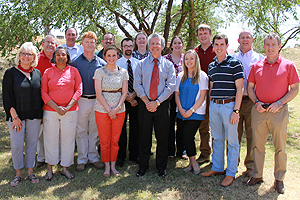On the Right Track: First FMAT Students Graduate

The inaugural eight-member FMAT class began their coursework in 2010, completing their medical degrees in three years instead of the standard four.
The United States is facing a primary care physician shortage. Family medicine physicians receive less pay than those in specialized medicine, yet still build the high debt that four years of medical school brings. The first class of medical students from an innovative program recently graduated from a program that hopes to change how medical schools will train and educate future primary care physicians.
In an effort to address the shortage, the School of Medicine created the three-year medical degree approved by the nationally recognized accrediting authority for medical education. The Family Medicine Accelerated Track (FMAT) program allows primary care students at the School of Medicine to complete their degree in three years at about half of the cost of the standard four-year program.
Changing Medical Education
Steven Berk, M.D., executive vice president, provost and dean of the School of Medicine, said with the baby boomer generation growing older and the increased demand for primary care with the new federal health care law, this program will address the need for more family medicine doctors.
“This is a program of national importance as we work to ensure that all Americans will have access to a primary care physician,” Berk said. “We committed to taking the first steps in changing how medical schools attract and educate future family medicine doctors. This program demonstrates that our School of Medicine is contributing to health care education nationally as well as locally.”
According to the American Academy of Family Physicians (AAFP), since 1997, U.S. medical school graduate matches in family medicine and general internal medicine programs have fallen by nearly 50 percent. A 2006 AAFP Workforce Study estimated that the U.S. would need approximately 39,000 more family physicians by 2020.
Ronald L. Cook, D.O., chair of the Department of Family and Community Medicine, said this program enables outstanding family medicine students to reduce the length of medical school by 25 percent and cut their debt in half.
“The high cost of medical school and resulting debt are major challenges for many prospective medical students,” Cook said. “Our program addresses debt on two levels, first by shortening the program from four to three years, and second, by providing scholarships to all qualifying students. With programs such as this, we can double the number of primary care physicians available to care for the U.S. population.”
Getting Attention
The first FMAT class included eight students who entered the School of Medicine in fall 2010. FMAT has received national coverage from the Associated Press, New York Times, USA Today, NBC Nightly News and others. Berk said medical schools and media from across the country have watched the program to see how it will work.
The School of Medicine FMAT program was approved by the Liaison Committee on Medical Education (LCME), the nationally recognized accrediting authority for medical education programs leading to the medical degree in U.S. and Canadian medical schools. The Association of American Medical Colleges and the American Medical Association sponsor the LCME.
Related Stories
Celebrating Veterans: TTUHSC’s General Martin Clay’s Legacy of Service and Leadership
From his initial enlistment in the Army National Guard 36 years ago to his leadership in military and civilian health care management roles, Major General Martin Clay’s career has been shaped by adaptability, mission focus and service to others.
Texas Tech University Health Sciences Center School of Nursing Named Best Accelerated Bachelor of Science in Nursing Program in Texas
The TTUHSC School of Nursing Accelerated Bachelor of Science in Nursing (BSN) program has been ranked the No. 1 accelerated nursing program in Texas by RegisteredNursing.org.
TTUHSC Names New Regional Dean for the School of Nursing
Louise Rice, DNP, RN, has been named regional dean of the TTUHSC School of Nursing on the Amarillo campus.
Recent Stories
The John Wayne Cancer Foundation Surgical Oncology Fellowship Program at Texas Tech University Health Sciences Center Announced
TTUHSC is collaborating with the John Wayne Cancer Foundation and has established the Big Cure Endowment, which supports the university’s efforts to reduce cancer incidence and increase survivability of people in rural and underserved areas.
TTUHSC Receives $1 Million Gift from Amarillo National Bank to Expand and Enhance Pediatric Care in the Panhandle
TTUHSC School of Medicine leaders accepted a $1 million philanthropic gift from Amarillo National Bank on Tuesday (Feb. 10), marking a transformational investment in pediatric care for the Texas Panhandle.
Texas Tech University Health Sciences Center Permian Basin Announces Pediatric Residency Program Gift
TTUHSC Permian Basin, along with the Permian Strategic Partnership and the Scharbauer Foundation, Feb. 5 announced a gift that will fund a new pediatric residency.
